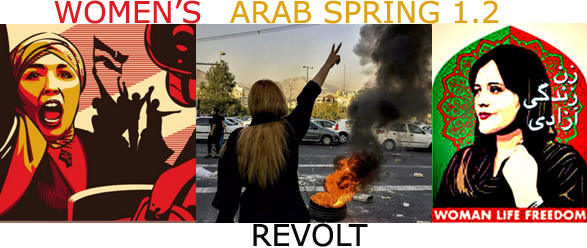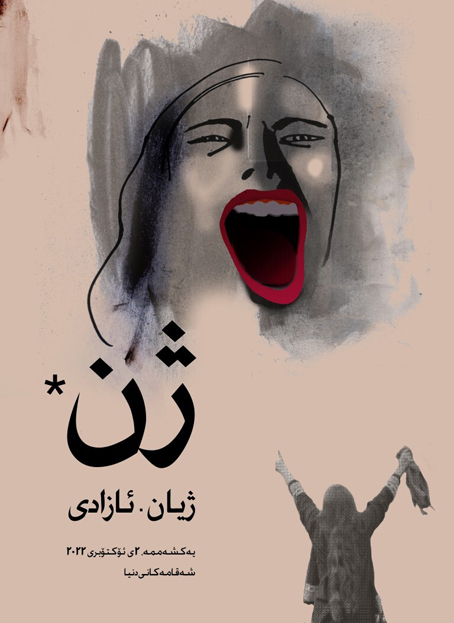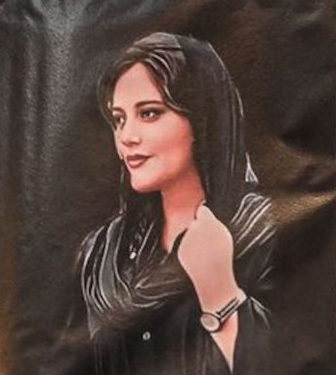
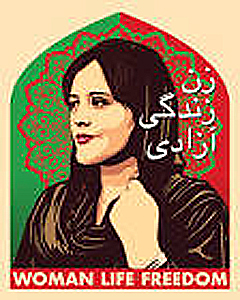
JINA MAHSA AMINI
The face of Iran's protests. Her life, her dreams
and her death.
In memory of Jina 'Mahsa' Amini, the cornerstone of the 'Zan.
Zendagi. Azadi revolution.
16 February 2023 | By Gino d'Artali
And also
Read all about the assasination of the 22 year young Jhina Mahsa
Amini or Zhina Mahsa Amini (Kurdistan-Iran) and the start of the Zan,
Zendagi, Azadi (Women, life, freedom) revolution in Iran
2022
And the latest news about the 'Women Live Freedom' Revolution per month in 2023:
October
15 - 1
--
September 30 - 16
--
September 17 - 1
--
August 31
- 18 --
August 15
- 1--
July 31 - 16
--July
15 -1--June
30 - 15--June 15-1--May 31 -16--
May 15-1--April--March--Feb--Jan
And for all topics below
that may hopefully interest you click on the
image:
|
'THE NO-HIJABIS
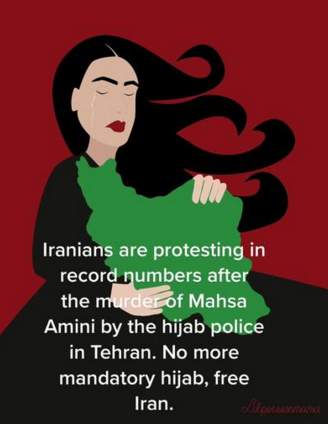
Updated October 12, 2023 |
'BIOLOGICAL
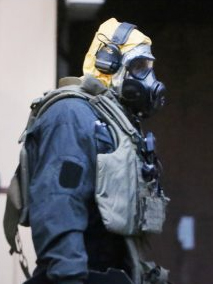
TERROR ATTACKS
AGAINST SCHOOLGIRLS'
Updated September 6, 2023 |
'IRANIAN JOURNALISTS
UNDER SIEGE'

Updated September 19, 2023
|
'BLINDING
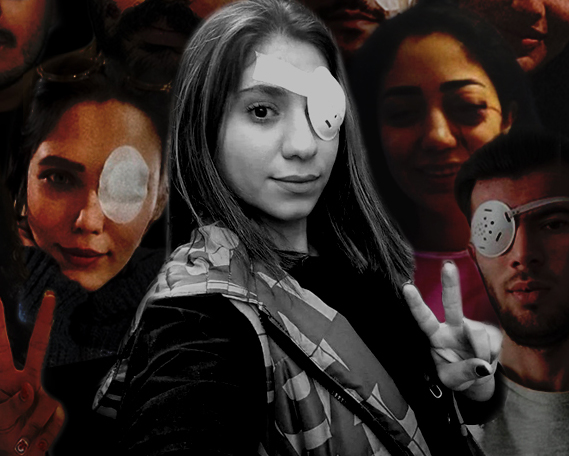
AS A WEAPON'
Updated October 11, 2023 |
'THE HANGING SPREE'
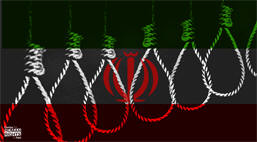
Updated October 10, 2023
|
CLICK HERE ON HOW TO READ
ALL ON THIS PAGE
When one hurts or kills a women
one hurts or kills hummanity and is an antrocitie.
Gino d'Artali
and: My mother (1931-1997) always said to me <Mi
figlio, non esistono notizie <vecchie> perche puoi imparare qualcosa da
qualsiasi notizia.> Translated: <My son, there is no such thing as so
called 'old' news because you can learn something from any news.>
Gianna d'Artali.
'THE JINA REVOLUTION'
Preface by Gino d'Artali: it may seem like the Jina Amini revolution
2023 has ended here with the bloodhounds of the regime having clamped
down on women; Zahedian's; Kurds and Iranians overall and of all kinds
of life but the regime may think 'the battle is over' but *the war
hasn't finished yet* because as Taraneh Alidoosti, an actress who
opposes compulsory hijab and a supporter of the Women, Life, Freedom
movement, wrote on Instagram in English that Mohammadi who won the Nobel
Peace Prize 2023 is a <Freedom fighter and Women's rights heroine.>
<For us, she sacrificed everything,> she added. <Freedom will come.>
And yes, Freedom will come because especially the women will never give
up the fight for total freedom.
Long live free Iran
UPDATE ABOUT NARGES
MOHAMMADI
Iranwire - October 10, 2023
Jailed Nobel Peace Prize Laureate Mohammadi Denied Access to Lawyer
The lawyer of Narges Mohammadi, the imprisoned Iranian activist who won
the 2023 Nobel Peace Prize, says he was prevented from meeting with his
client because she refused to wear a head covering. <Today, I went to [Terhran's]
Evin prison to meet with Mrs. Narges Mohammadi,> Mustafa Nili wrote on
the social media platform X. <After waiting for a while in the meeting
hall, I was informed that the prison authorities would not allow the
meeting to take place because Mrs. Mohammadi had not complied with the
mandatory headscarf and hijab rules,> Nili added. <As a result, I left
the prison without having the meeting.> Mohammadi, who was announced as
the winner of the Nobel Peace Prize last week for her fight against the
<oppression of women> in her country, has repeatedly stated her
opposition to the Islamic Republic's strict dress code for women.
Mohammadi has been imprisoned multiple times over the past decade for
her civil rights activities. She was most recently arrested in 2022 and
sentenced to 10 years 9 months in prison on fabricated charges. From
Evin prison, the outspoken activist has published numerous letters
protesting prison conditions and violence against inmates.>>
Source:
https://iranwire.com/en/prisoners/121401-jailed-iranian-activist-mohammadi-denied-access-to-lawyer/
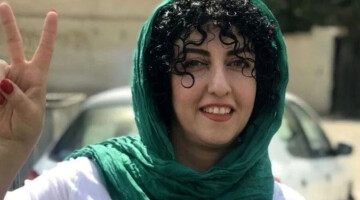
NCRI - Womens committee - October 6, 2023 - in Women's News
<<Welcoming the awarding of the Peace Prize to the political prisoner
Narges Mohammadi and calling for action for her release.
The NCRI Women's Committee welcomes the Nobel Committee's attention to
the struggle of Iranian women for freedom and equality against the
religious and misogynistic dictatorship ruling Iran and its awarding of
the Peace Prize to political prisoner Narges Mohammadi. This action is
against the religious fascism ruling Iran, which has subjugated all
women in the past four decades and deprived them of their fundamental
rights. The regime has arrested, tortured, and executed tens of
thousands of Iranian women. The NCRI President-elect, Mrs. Maryam Rajavi,
congratulated Mrs. Mohammadi and recalled the Iranian Resistance's
repeated calls for her release. She once again urged the International
Community to intervene and secure the release of Mrs. Mohammadi and
other political prisoners, especially women. Mrs. Rajavi reiterated,
<Beyond the symbolic gestures, the time has come to adopt a decisive
policy against the ruling regime and its oppressive measures against
women. The world can no longer deny Iranian women’s role in the struggle
against the regime. We are facing a generation of combatant and
rebellious women in Iran, many of whom are in prison.>
National Council of Resistance of Iran (NCRI)-Women's Committee>>
Source:
https://women.ncr-iran.org/2023/10/06/peace-prize-narges-mohammadi/
Read more below about this heroine of the Jina Amini Revolution who
sacrifices all to help lead the women to a
victorious ending:
Iranwire - October 6, 2023
<<Narges Mohammadi's Nobel Renews Hope for Iranian Women and Human
Rights Supporters
Narges Mohammadi, a human rights activist and political prisoner in the
notorious Evin Prison, has been awarded the 2023 Nobel Peace Prize. This
marks the second time an Iranian woman and champion of human rights have
been honored with the prestigious award. The Nobel Committee, guided by
the motto <Woman, Life, Freedom,> acknowledged in their statement
Mohammadi's unwavering dedication to combating the oppression of women
in Iran and her relentless efforts to advance human rights and freedom
for all.
Nobel Committee's Message to the Islamic Republic: Listen to the People
On Friday, October 6, the Nobel Committee in Norway made its momentous
announcement, bestowing the prestigious international award upon Narges
Mohammadi. The statement says Mohammadi's <fight against the oppression
of women in Iran and her fight to promote human rights and freedom for
all> inspired the award. <Her brave struggle has come with tremendous
personal costs. Altogether, the regime has arrested her 13 times,
convicted her five times, and sentenced her to a total of 31 years in
prison and 154 lashes,> the statement adds. The Nobel Committee also
said the rallying cry of recent protesters in Iran, <Woman, Life,
Freedom,> encapsulates Mohammadi's sacrifices and dedication. Berit
Reiss-Andersen, chair of the Norwegian Nobel Committee who announced the
prize in Oslo, said the prize >is first and foremost a recognition of
the very important work of a whole movement in Iran with its undisputed
leader, Nargis [sic] Mohammadi.> Reiss-Andersen said the committee hopes
the prize <is an encouragement to continue the work in whichever form
this movement finds to be fitting.> She also urged Iran to release
Mohammadi in time for the prize ceremony on December 10. Reis-Anderson
expounded on the rallying cry of <Woman, Life, Freedom> itself. <Woman,>
Reis-Anderson, said <fights for women against systematic discrimination
and oppression.> Regarding <life,> the statement highlighted Mohammadi's
support for women's quest for the right to lead fulfilling and dignified
lives, despite facing harassment, incarceration, torture, and even death
throughout Iran in pursuit of this goal. And <freedom> suggested that
<she fights for freedom of expression and the right of independence, and
against rules requiring women to remain out of sight and to cover their
bodies. Freedom demands expressed by demonstrators apply not only to
women, but to the entire population.>
<Ms Mohammadi is still in prison as I speak,> Reis-Anderson said.
Narges Mohammadi, beyond her 13 arrests, five convictions, and a
cumulative sentence of 31 years in prison and with 154 lashes, has also
courageously exposed the physical and sexual harassment of women by
security agents during detentions and imprisonment in Iran. Such
harrowing experiences and bold efforts have placed Mohammadi squarely in
the path of an authoritarian system's brutality - yet they have failed
to silence her clarion call for justice. The Nobel Committee's statement
regarding Mohammadi explicitly acknowledged also: <Her valiant struggle
[which] has exacted a tremendous personal toll.> <Her activism against
the death penalty led to Mohammadi's re-arrest in 2015, and to a
sentence of additional years behind walls,> The Nobel Peace Committee's
statement reads. <Upon her return to prison, she began opposing the
regime's systematic use of torture and sexualised violence against
political prisoners, especially women, that is practised in Iranian
prisons,> the statement adds. In recent years, Mohammadi has been unable
to live with her family, who were compelled to leave Iran. Taghi Rahmani,
her husband, departed Iran in January 2012, having been arrested over
eight times and spending a significant portion of his life behind bars.
After Mohammadi was sentenced to prison, their two children also left
Iran to join their father. During her detention and imprisonment,
Mohammadi was repeatedly denied the opportunity to speak with her
children. An hour after the news of the Nobel, Mohammadi's family issued
a statement, extending their congratulations to all Iranians, especially
the courageous women and girls of Iran. They said, <This remarkable
honor is a lasting testament to Narges Mohammadi's tireless civil and
peaceful efforts to bring about change and freedom for Iran.> Her family
expressed their regret that she remains in prison and added,
<Unfortunately, Narges is not with us to share this wonderful moment
because she has been unjustly imprisoned, and we cannot witness her
joyful reaction to this remarkable and glorious news.> <This remarkable
honor belongs to each and every one of you, the resilient and brave
people of Iran, who have tirelessly and peacefully fought for freedom,>
the statement added. Previously, Mohammadi had written a letter to
IranWire regarding the years spent away from her children. She
reflected, <I have paused in time; those tiny slippers my daughter used
to wear have become a distant memory. I saw Kiana on Skype; she has
grown up, her hair is long, and her face has changed. Ali has changed,
and my curly-haired little boy has grown taller.> Another portion of the
letter stated, <Tyranny halts life. It transforms distance into an
active force while rendering meetings and togetherness passive.>
<Tyranny scorches the soul and inflicts harm upon it, both seen and
unseen. It's not just physical torture, imprisonment, exile, and
suppression; tyranny withers away the vitality of human existence from
every angle and at every moment,> Mohammadi wrote.
Three Decades Dedicated to Women's Rights
Nearly three decades of dedicated work in advancing human rights in
authoritarian Iran have marked Narges Mohammadi's remarkable journey.
She began working as a journalist at Payam Hajar weekly in 1996 while
also joining the Human Rights Defenders Center. Today she serves as Vice
President of the Human Rights Defenders Center and leads its Women's
Committee. Mohammadi is also a founding member of the National Peace
Council in Iran, where she has held the position of Executive Board Head
since 2018. She has been a prominent advocate against the death penalty
in Iran and an active participant in the Legam campaign, striving for
the gradual abolition of executions. This indefatigable human rights
advocate initiated a campaign against solitary confinement and gathered
substantial first-hand testimony concerning the sexual abuse of female
prisoners. In February 2018, Mohammadi was among 15 political and civil
activists who emphasized the <irreformability> of the Islamic Republic
and called for a United Nations-supervised referendum to facilitate a
<peaceful transition> from the existing government to a <secular
parliamentary democracy.>
On July 15, 2022, Mohammadi expressed her support for the movement
opposing compulsory hijab in Iran via a note on her Instagram page. In
her statement she addressed the Head of the Judiciary, emphasizing that
the Iranian women's struggle for the right to choose their own clothing
is not a shameless act but a courageous quest for their rights. And in a
message published on the one-year anniversary of Mahsa Amini's death in
custody, last month, she and a group of political prisoners labeled the
day as <the commemoration of the religious authoritarian regime's
oppression against the women of Iran.>
The Second Nobel Peace Prize Awarded to an Iranian Woman
Shirin Ebadi, a jurist, former judge, author, and lecturer, made history
as the first Iranian to win the Nobel Peace Prize in 2008. The Nobel
Peace Prize is one of five Nobel Prizes endowed by Alfred Nobel, a
Swedish industrialist and inventor. It was first presented in 1901. In
his will, Alfred Nobel stipulated that this prize should be awarded to
someone who has made the most outstanding contribution to the promotion
of international brotherhood, the reduction or dissolution of armed
forces, or the establishment and encouragement of peace conferences.
Unlike the other Nobels, the Peace Prize is not awarded in Stockholm;
instead, it is bestowed annually in Oslo, the capital of Norway. Over
the years, Nobel Peace Prize candidates and laureates have faced various
controversies and political challenges, but the list of winners includes
influential figures such as Nelson Mandela, Jane Addams, Martin Luther
King, Mother Teresa and the Dalai Lama. Additionally, organizations like
the Red Cross, the United Nations High Commissioner for Refugees, the
International Labor Organization, Amnesty International, and the
International Campaign to Abolish Nuclear Weapons, have been recognized
with the award. Iranian authorities remained silent today in response to
the awarding of this prize to a human rights activist imprisoned in
Iran. Recent anti-establishment protests in Iran were sparked by the
death of 22-year-old Mahsa Amini, in September 2023, while in police
custody for an alleged head scarf violation. The authorities responded
to the women-led protest movement with a brutal crackdown that has
claimed the lives of more than 500 people. Thousands of others have been
unlawfully arrested and prosecuted as well as injured and maimed.
Mahmood Amiry-Moghaddam, director of the Norway-based Iran Human Rights
organization, expressed the hope that Mohammadi's Nobel prize award
<will draw the international community's attention to the Iranian
people's struggle for their fundamental human rights.> Reporters Without
Borders reiterated its call on the authorities in Iran to release the
activist, who the Paris-based media freedom watchdog said <continues to
report and denounce abuses against women while in detention.> In
Germany, parliament member Ye-One Rhie said the 2023 Nobel Peace Prize
<goes out to you and your bravery and to everybody fighting for women's
rights all over the world. Especially in Iran. Please keep fighting. We
see you.> Many Iranian artists and activists also welcomed Mohammadi's
Nobel Peace Prize. Taraneh Alidoosti, an actress who opposes compulsory
hijab and a supporter of the Women, Life, Freedom movement, wrote on
Instagram in English that Mohammadi is a <Freedom fighter and Women's
rights heroine.>
<For us, she sacrificed everything,> she added. <Freedom will come.> >>
Source:
https://iranwire.com/en/women/121268-narges-mohammadis-nobel-renews-hope-for-iranian-women-and-human-rights-supporters/
Reaction of raisi and his shi'ite mullahs on October 9, 2023:

Narges Mohammadi
Iranwire - October 9, 2023 - by SOLMAZ EIKDAR
<<The Islamic Republic's Revenge against Iran's First Nobel Prize
Winner
The Islamic Republic government rules a country where two of its
women, both defenders of human rights, have now won the Nobel Peace
Prize. Before Narges Mohammadi, who is now incarcerated in Tehran’s Evin
Prison, Shirin Ebadi, a lawyer and children rights activist, received
this prize in 2003. Since then, the Islamic Republic has done everything
it could to take revenge against her.
***
Twenty years ago, Iran's battered civil society was given a jolt
of hope: Shirin Ebadi, a woman, a lawyer and a human rights activist,
became the first Iranian to win the most prestigious <peace> award in
the world. When on the evening of October 15, 2003, Ebadi returned to
Iran with her Nobel Peace Prize, she was welcomed by hopeful citizens
who were chanting <Iran for ALL Iranians.> The reactions of the Islamic
Republic's officials to this prize, however, were not a promise of
better days ahead. President Mohammad Khatami who, at that time, was
popular among young and progressive Iranians, had this to say about the
event: <The Nobel Peace Prize is not important; its literature and
science award are more important.> Khatami's and other officials'
dismissive shrug was, in fact, a warning about future actions against
Iran's first Nobel Laureate.
The Vengeance Starts
At the time, it was assumed that the Nobel Peace Prize would
provide some degree of protection for this world-renowned lawyer who had
been repeatedly harassed for accepting to represent plaintiffs in cases
such as the Chain Murders of dissidents and the 1999 attack on a
university dormitory in Tehran. But the Islamic Republic was determined
to take revenge against her. Immediately after receiving the Nobel
prize, the authorities increased their pressure on Shirin Ebadi, but
this harassment reached new heights after the disputed 2009 presidential
election.In 2009, Ebadi used a speech in Spain to tell the world about
the violent and widespread violations of human rights against the Green
Movement protests sparked by a disputed presidential election. In her
book Until We Are Free: My Fight for Human Rights in Iran, Ebadi cites
an example of warnings she received at the time: “Very soon, the
government summoned two of my colleagues for interrogation and sent me a
message through them: 'Tell Ebadi to remain silent and we would leave
her alone. When things cool down, we'll allow her to [re-]open the
office for the [Defenders of Human Rights] Center.'> Ebadi's refusal to
heed this warning resulted in pressures on her husband Javad Tavassolian.
For some days in the late summer of 2009, Ebadi could not reach her
husband on the phone and her sister in Iran could not find out what had
happened to him. After a few days, her husband called Ebadi and said
that agents of the Intelligence Ministry had filed <moral> charges
against him and they had flogged him as punishment for drinking alcohol
immediately after they had arrested him. Three days after the arrest of
Ebadi's husband, he was sentenced to death by stoning on the charge of
<adultery.> Then Tavassolian's handler, a man by the name of Mahmoudi,
told him that the only way to escape execution was to read a text in
front of a camera that portrayed Ebadi as a foreign agent and her Nobel
prize as a tool for bringing down the Islamic Republic. Tavassolian, who
became a broken-down man after his arrest, interrogations, trial and
imprisonment, accepted the ultimatum, and an appeals court replaced the
death sentence with a fine of 100,000 tomans. The forced confessions of
Javad Tavassolian was finally aired on state-run TV on June 11, 2010,
the day before the first anniversary of the disputed 2009 presidential
election. In the <interview,> he accused his wife of <carrying out
orders from abroad> and of having played a role in organizing the
post-election demonstrations. Repeating what the interrogators had told
him to say, he even accused his wife of not respecting <human rights> at
home during their long marriage: <In our home, she did not even respect
the human rights of four people. Once she broke my glasses and at
another time she tore my shirt. She attacked and beat me.> The program
ended with Tavassolian announcing that he wanted to separate from Ebadi
unless she returned to Iran and expressed remorse for her actions. The
couple had married in 1975 but agreed to a divorce to save Tavassolian.
In December 2009, Dr. Nooshin Ebadi, Shirin Ebadi's sister, was kept in
custody for 17 days during which she was pressured to sever her
relations with the activist; otherwise, she was told she would be
dismissed from her university job.
Earlier, in 2008, when around 100 guests were to gather for a
ceremony at the Defenders of Human Rights Center, the building was
locked down by government agents. But they did not stop here: They
raided Ebadi's office and confiscated computers as well as confidential
papers relating to her legal work. Then, in December 2008, a group of
plainclothes agents attacked Ebadi's office and home with stones,
chanting <Execute Her!>
Confiscation of Properties
Five years after Ebadi received the Nobel Peace Prize, the
Islamic Republic government went after her finances and properties. The
government claimed Ebadi owed taxes on the $1.3 million Nobel prize
money and fees she had been paid for her speeches in other countries.
Ebadi used the Nobel Peace Prize money to found the Defenders of Human
Rights Center, the Society to Protect the Rights of the Child and the
Mine Clearing Collaboration Association. The government claimed that
Ebadi must pay a tax of 330 million tomans, but her lawyer, Nasrin
Sotoudeh, told Radio Farda at the time that, according to Iranian law,
she was exempt from paying taxes on her cash prize. According to
Sotoudeh, the prize came from a non-profit organization and the prizes
awarded by the Nobel Foundation must be considered scientific prizes;
therefore, they are exempt from taxation. The government confiscated and
sold two properties belonging to Ebadi after the Ministry of Science
announced that the Nobel Peace Prize is not a scientific prize. And,
even though she was no longer living in Iran, she was banned from
leaving the country if she returned because she had refused to pay her
taxes. The government also confiscated her Nobel Peace Prize and other
awards she had received from her bank box. This series of harassment, of
course, forced Ebadi to remain in exile, and Iranians lost one of their
most effective lawyers and human rights activists. Now, after 20 years,
another Iranian woman and human rights activist, Narges Mohammadi, won
the same prize and the reactions of the Islamic Republic's officials to
this event are similar to those following Ebadi's awarding. Hossein
Amir-Abdollahian, the current foreign minister, was one of the first
government officials to dismiss the importance of Mohammadi's peace
prize. <The presence of tens of millions of people in the funeral of
martyr Ghasem Soleimani [the commander of the expeditionary Quds Force
who was assassinated in a US drone strike in 2020] in Iran and Iraq and
the sympathy of the world was the most magnificent and lasting peace
prize in history,> he said. Meanwhile, media outlets affiliated with the
Islamic Republic published articles against the Nobel Peace Prize and
Mohammadi. These reactions must be seen as warnings that the Islamic
Republic is going to treat Mohammadi the same way it treated Ebadi, with
a notable difference: Mohammadi is already their captive in Evin
Prison.>>
Source:
https://iranwire.com/en/politics/121345-the-islamic-republics-revenge-against-irans-first-nobel-prize-winner/
My personal reaction: I've been encarcellated too for 3 very long years,
too short to be comparable, but going through hell and running on the burning coals and my soul-sister
always described me as 'Fuerte siempre' - always strong - and that is
how I would like to describe with awe mrs. Narges Mohammadi who will
never give up to fight for a long live free Iran. With deepest respect, Gino d'Artali
---

JINHA - Womens News Agency - October 3, 2023
<<At least 463 people detained by Iranian security forces in September
At least 463 people were detained by Iranian security forces in
September 2023, according to the Hengaw Organization for Human Rights.
News Center- According to statistics compiled by the Hengaw Organization
for Human Rights, a Norway-based human rights organization, at least 463
individuals were detained by Iranian security forces across the country
in September 2023, a 75% increase compared to previous month.
44% of the detained people were Kurds
In September 2023, at least 203 Kurds were detained by Iranian security
forces, comprising 44% of the total detentions across Iran last month,
the organization reported. <Arbitrary detention of religious minority
activists continued in September, similar to previous months, with at
least 17 religious minority activists detained by government entities.
Among those arrested, 8 were Baha'i adherents, including 4 women and 4
men. Additionally, during the past month, eight Sunni individuals from
various cities in the provinces of Hormozgan, Fars, Sistan, and
Baluchestan, as well as one Armenian descendant, were detained by
Iranian government entities,> said the organization
51 women, 50 children detained
According to the Hengaw Organization for Human Rights, at least 51 women
were detained across Iran during the past month. This number accounts
for 11% of all detentions. 50 minors under the age of 18 were detained
or forcibly disappeared by security and government entities across Iran.
<Out of these underage minors, 37 (74%) were Baloch, 10 were Kurdish,
and 2 were detained in the cities of Mashhad and Tehran.>
Detention of students, teachers and activists
The Hengaw Organization of Human Rights also reported that at least four
students, four journalists and media activists as well as 14 artists and
actors were detained in various cities across Iran in September 2023.>>
Source:
https://jinhaagency1.com/en/actual/at-least-463-people-detained-by-iranian-security-forces-in-september-33938
Iranwire - October 2, 2023 , 2023
<<Trial of Amini Family's Lawyer Goes On
Branch 28 of the Tehran Revolutionary Court has held a second hearing in
the trial of Saleh Nikbakht, the lawyer who represents Mahsa Amini's
family. Nikbakht was charged with <propaganda activities> against the
Islamic Republic over interviews he gave to domestic and foreign media,
in which he criticized the government's handling of Amini's death and
its aftermath. The Ministry of Intelligence, which is the plaintiff in
the case, alleges that the defendant has been <motivating> the Amini
family to seek legal redress for their daughter's death in police
custody in September last year.
The first court hearing took place on August 29.
<The court proceedings were relatively brief, as the court's president
had prepared written questions for me to answer in advance,> Nikbakht
told Radio Farda after the second court hearing. <It seems that both the
expert of the Ministry of Intelligence, who provided an explanation, and
the court itself were focused on understanding why I did not accept the
results of the forensic examination,> he added. Mahsa Amini, 22, died
during a visit to Tehran on September 16, 2022, after she was arrested
by the morality police for allegedly wearing the mandatory headscarf
improperly. The authorities claim the young woman died of natural
causes, but eyewitnesses and her family say she was beaten while inside
a police van that took her to a detention center. Amini's death sparked
months of nationwide protests. More than 500 people were killed in the
clampdown by security forces and over 20,000 were unlawfully detained,
including dozens of lawyers. Following biased trials, the judiciary has
handed down stiff sentences, including the death penalty, to
protesters.>>
Source:
https://iranwire.com/en/news/121109-trial-of-amini-familys-lawyer-goes-on/
Opinion by Gino d'Artali: The Jina Amini commemoration revolution isn't
over yet and will continue every year and if only to disgrace the regime
with our mutual goal the fall of this disgracefull animals. Long live
free Iran.
And the regime cannot take all Iranians to court. That's food for
thought and the family of our dear sister Jina Amini will finally also
win this battle trusting in Allah as they are.
Click
here to go to the 'Woman, Life, Freedom' section
Womens'
Liberation Front 2019/cryfreedom.net 2023
